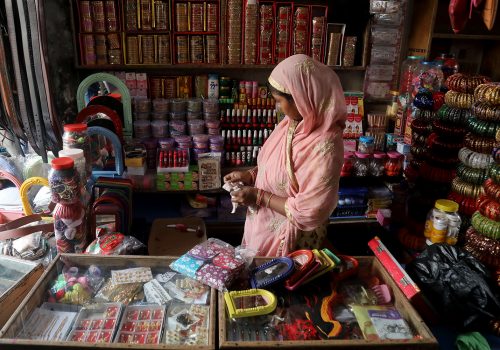The future is here: A guide to the post-COVID world 03/12/2021
Welcome to your guide to where the world is headed during the pandemic era and beyond. Each week, we’ll bring you the latest and most significant expert insights and international news about how coronavirus is reshaping international affairs. To stay updated each week, sign up to the newsletter here.
A quick note: There will be no March 19 edition. We will resume The Future Is Here on March 26.
Let’s take a spin around the globe, in seven minutes or less.
In top stories this week:
- Four countries meet in the Quad to ink a deal on vaccine production.
- As some point fingers at the European Union for vaccine nationalism, the EU is placing blame elsewhere.
- Why phones may play a new role in the post-pandemic office.
- But first…
The big story
This week’s key theme: The United States’ turbocharged economic recovery may leave emerging markets far behind
The wrangling is over, for now at least, with the US Congress approving a $1.9 trillion relief package and US President Joe Biden signing it into law. A flurry of government spending is on its way, The Washington Post reports, along with a major (albeit temporary) boost for anti-poverty measures to help millions of households still contending with the impact of the pandemic.
The stimulus plan is set to turbocharge the US economic recovery, as the Financial Times puts it, just as a mass vaccination program helps the American economy open up. “The U.S. is going to play the role of the global locomotive again in 2021,” The Wall Street Journal quotes Catherine Mann, global chief economist at Citibank, as saying.
But the strength of that rebound could knock weaker economies out of kilter, especially in the developing world, the Journal cites the Organisation for Economic Cooperation and Development (OECD) as observing. An increase in US bond yields in response to higher forecasts for growth and inflation could lead to investors pulling funds out of emerging markets, according to the OECD.
“US Treasuries are probably the world’s most important financial market, but it’s easy to forget about them when they’re well-behaved,” Bloomberg Businessweek says. The yield on the benchmark ten-year Treasury bond climbed as high as 1.62 percent this month, compared with less than 1 percent at the start of 2021. That has implications for the US economy too.
“The spike in 10-year yields suggests that efforts to revive the economy are working, but if those rates rise too quickly, there’s a risk they’ll nip the recovery in the bud,” the article explains.
Higher yields also make it more expensive for governments to service their debts and cause major firms to face increased debt costs too, which in turn hits the stock market, CNBC reports.
The OECD now expects the US economy to expand by 6.5 percent in 2021, more than twice the rate it forecast in November. That expansion, the fastest pace since 1984, would produce a US economy that is larger at the end 2022 than it was before the pandemic began. Out of the Group of Twenty (G20) bloc of advanced economies, only Turkey is in a similar position, the Journal adds.
Widening access to vaccinations worldwide is the best way to avoid triggering a wave of investors shifting capital to the United States at the expense of emerging-market economies, depressing their currencies and compromising economies already struggling to recover from the pandemic, says OECD Chief Economist Laurence Boone, the Journal reports. But in sub-Saharan Africa, a region of 1.1 billion people, fewer than 500,000 people have been inoculated so far, according to Bloomberg Equality.
“The wider the divergences across countries regarding vaccinations, the wider the differential in the pace of growth,” says the OECD’s Boone. “[T]hat paves the way for capital outflows.”
Subscribe to The future is here: A guide to the post-COVID world
Sign up for a weekly roundup of top expert insights and international news about how coronavirus is reshaping international affairs.

The world in brief
Insights from across the planet, in ten bullets or fewer
- Easier to spend than save? COVID-19 questions that. By not spending money on everything from commuting to work to vacations, consumers in the world’s richest countries who kept their jobs during the pandemic built up $2.9 trillion in extra savings during recent lockdowns, Bloomberg Economics estimates. Pent-up demand could fuel a consumer-spending boom once restrictions are lifted, but such a spending binge could undermine an increase in household savings, which is among the few silver linings of the pandemic, Bloomberg reports.
- QUOTE: “This period is actually the first time that many people have experienced saving a significant amount,” says Nida Broughton, director of economic policy at the Behavioural Insights Team, a UK government-backed company known as The Nudge Unit, Bloomberg reports. “Psychologically it’s a very opportune moment to build on that.”
- “I am close to quitting my career”: The pandemic is taking a toll on mothers. Two in five working mothers have taken or are thinking about taking a step back at work, as the pandemic forces parents into an impossible juggling act between childcare and their career, according to a global survey of Financial Times readers. The proportion of fathers looking to cut their workloads was 10 percentage points lower, the newspaper adds.
- Whether employer or employee, you may be using your phone more as you head into the office. Investors are pouring money into phone apps that allow companies and landlords to track workers’ movements and check that they comply with COVID-19 health protocols including social distancing, The Wall Street Journal reports. Similar technology has been available for years, but it’s garnering more attention now as millions of employees could return to workplaces this year amid the US rollout of vaccines, the Journal adds.
- China’s uneven pandemic recovery “understated.” The services sector in China has been slow to rebound, and that’s “one of the most understated [aspects] of China’s recovery,” CNBC cites Shaun Roache, chief economist for Asia-Pacific at S&P Global Ratings, as saying. China was the only major economy that grew last year despite the pandemic as exports remained resilient, but consumption has lagged, CNBC says.
- Quad leaders ink billion-dose Asia deal. US President Joe Biden and the leaders of Japan, India, and Australia, known as the Quad leaders, agreed to supply as many as a billion doses of COVID-19 vaccines to the Indo-Pacific region by end of 2022, Reuters reports. An open and free Indo-Pacific region is “essential” to all four nations, Biden said in the first meeting of Quad leaders, a group pivotal to his efforts to counter China’s growing economic and military power.
- QUOTE: “The virus will definitely mutate and will keep mutating; the longer we keep the virus around the more mutations we’ll see,” says Phionah Atuhebwe, the New Vaccines Introduction Medical Officer in Africa for the World Health Organization, Bloomberg Equality reports. “If Africa is not vaccinated and we are a source of mutations, we put the whole world at risk.”
- Here comes the vaccine finger-pointing. The European Union pushed back against accusations of vaccine nationalism after Italy blocked the export of 250,000 doses of COVID-19 vaccines to Australia last week, leading to heavy criticism of the bloc, The Washington Post reports. Many other shipments have left the EU, the bloc notes, while also calling out the United States and the United Kingdom for failing to share vaccine doses with the world.
- The torch is among the final hurdles on the track to the Olympics. Any setbacks in the Olympic torch relay, which starts in two weeks in northeastern Japan, could lead to more doubts about hosting the Olympics despite the risks presented by the pandemic, The Associated Press reports. Organizers say shouting and cheering is not allowed by spectators along the four-month route that will involve ten thousand runners and will touch all of the country’s forty-seven prefectures. Authorities are taking a risk with the relay partly because of sponsorship deals with Coca-Cola and Toyota, according to the news service.
The inside scoop
Insights from the Atlantic Council



